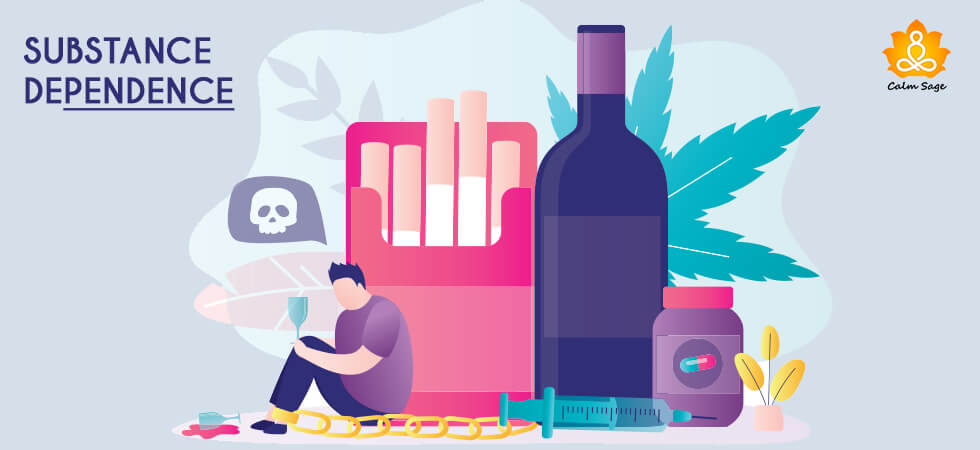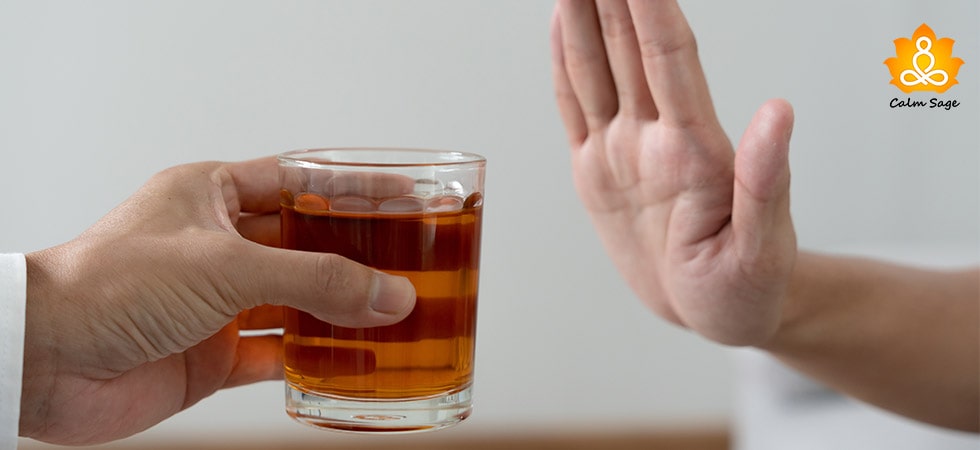All You Need To Know About Substance Or Drug Dependence

Prior, substance abuse and substance dependence used to be listed as separate mental health conditions in the Diagnostic and Statistical Manual of Mental Health Disorders (DSM), however in the latest version which is the 5th edition (DSM-5), they are both listed under the umbrella of substance use disorder.
Substance dependence is quite different from substance addiction as it occurs when an individual is physically dependent on a particular substance to the extent that their body adapts to the excessive use of the substance and develops tolerance towards it. So, whenever an individual stops getting that particular substance, they start experiencing withdrawal symptoms.
Overall, it can be a complex health condition because it not only impacts the brain but the behavior and body as well. In this blog, we will be taking a deep look at what substance dependence is, its symptoms, stages, causes, diagnosis, treatment, and more. So, let’s get started!
Difference Between Substance Dependence and Drug Addiction
Over the internet, I have observed that a lot of people are getting confused between the two terms, so let’s take a look at the differences between both conditions:
| Substance Dependence | Drug Addiction |
|---|---|
| Substance dependence is a condition characterized by dependency on a substance without being addicted to it. Generally, dependence is a bodily response towards the consumption of a substance. | Now, addiction is not the same as dependence because it occurs when someone is addicted to drugs without being dependent on them. |
| Substance dependence might occur when an individual relies so much on a medication or a substance which might result in conditions such as high blood pressure, glaucoma, or diabetes. | Drug addiction usually occurs when someone keeps on using drugs even after understanding the consequences, is unable to stop using drugs, or uses drugs so excessively that it impacts their professional and personal life |
| Substance dependence might show few or all of the symptoms of addiction. | Whenever an individual tries to stop drug addiction, they might develop intense cravings or physically ill symptoms. |
Symptoms of Substance or Drug Dependence
There are some situations wherein the addictions turn into dependence. Generally, substance dependence is caused by reaching a physical tolerance, below listed are some of the common symptoms of substance dependence:
- Anxiety
- Body aches
- Depression
- Developed tolerance towards a substance which increases the need to take more substance
- Experiences withdrawal symptoms whenever tries to stop the consumption
- Making excuses
- Muscle weakness
- Nausea
- Nightmares
- Resorts secretive behaviors
- Sweating
- Unable to control the use of substance abuse or losing control over the need to consume substance
- Unknown urge to use or consume the substance regularly
- Usage of the substance in a risky setting
- Vomiting
Stages of Substance Dependence
Substance dependence usually progresses into different stages, understanding the stages of substance dependence might help you or your loved one to seek the right assistance.
Stage 1: Experimentation
This stage of substance or drug dependence involves trying different substances alone or with peers. This behavior can also be an escape or defense from one’s parents, responsibilities, or authority figures.
Stage 2: Regular Use
The second stage of substance use revolves around the regular use of substances. When an individual starts using the substance more often, they usually display an increased ability and start developing a physical tolerance towards it.
Whenever the substance is used, it might give an escape from the negative feelings. Slowly, when the regular use becomes excessive, people start missing school or work and they start spending more time with their peers who misuse drugs.
Stage 3: Dependence
The regular use of a substance gradually converts into dependence and the person starts adapting to the substance by physically being dependent on it. Scientifically, when someone starts being dependent on a drug, they are not able to achieve the same effect and eventually they start consuming more drugs in order to escape.
Stage 4: Problematic Use
After becoming severely dependent on the drug, the person starts prioritizing substance use above everything. They stop focusing on their work, relationship, family, or other interests. You may find them lacking or losing motivation to do anything and display different behavioral symptoms. They may seem involved in secretive or risky behaviors. In order to support their habit, they might even start selling drugs or start obtaining more from their seller.
Stage 5: Addiction
During this stage, the dependence starts becoming addiction as the individual starts losing control over things and now they are unable to face regular things without it. They might decline to maintain hygiene, morning rituals, or family work. You might seem they are more involved in legal problems, financial difficulties, or in conflict with others.
Also Read: Addictive Personality Disorder | Is It A Real Disorder Or A Myth?
Causes of Substance or Drug Dependence
According to studies, around 22.7 million American residents struggle with alcohol or drug problems. Now, the question is what causes or triggers them to draw towards substance:
- Family history of substance use or addiction
- Surrounded in an environment wherein drugs are easy to access
- Family history or personal history of anxiety
- Family history or personal history of depression
- Family history or personal history of other mental health conditions
According to the American Psychiatric Association (APA), during substance dependence our body and brain adapt to the effects of the substance, in such cases, people might need to consume more drugs in order to achieve the same effects. Consecutively, this results in the cycle of addiction or drug dependence which might turn into a substance use disorder.
Below listed are some of the common risk factors that might develop into substance use disorder:
- Environmental stressors
- Genetics
- Specific personality characteristics
- Presence of mental health conditions
- Social pressures
Also Read: 8 Best Alcohol Addiction Recovery Apps You Should Consider
Diagnosis of Substance Dependence
If you think you or your loved one might be experiencing substance dependence, you may contact a physician as a first-line treatment step. The fact is that substance dependence might also develop due to a specific medication use, therefore, if you think that the cause might be related to a specific medication, connect with a physician or a healthcare provider in your local area.
Coming forth, if you think you or your loved one might be dependent on alcohol, nicotine, or drugs, contact a healthcare provider to seek the right diagnosis. Your healthcare provider will generally determine if you need to connect with a mental health provider or not after the classification of symptoms.
Treatment of Substance Dependence
There are different treatment options for substance dependence which generally depend on factors like age, medical history, severity of the symptoms or dependence, type of substance used, or tolerance level towards a substance. Below listed are some of the common yet effective treatment approaches for substance use disorder:
- Detoxification: Detoxification helps in flushing out the substance out of the body. It is one of the effective treatment options for treating substance use, dependence, or addiction. It is generally facilitated in a hospital under the supervision of medical professionals.
- Medication: A physician might prescribe medications for treating withdrawal symptoms to prevent relapse or reduce cravings.
- Rehab facilities: Rehab sessions can also be attended to bring positive lifestyle modifications and to work on specific symptoms.
- Mutual aid groups: Mutual aid groups such as Narcotics Anonymous and Alcoholics Anonymous can be used for facilitating peer-based recovery.
- Therapy: Therapy is generally prescribed to change negative behaviors, stressors, or triggers that might underline a mental health issue.
Quick Takeaway: Best Online Support Groups for Sobriety
Below listed are some of the best online support groups for sobriety:
- Alcoholics Anonymous
- Women for Sobriety
- In the Rooms
- SoberGrid
- Recovery Dharma
- SMART Recovery
- AI-Anon Family Groups
I hope this blog helps you understand all you want to know about substance or drug dependence. For more such content, connect with us through all social media platforms.
Thanks for reading!




















